MercoPress. South Atlantic News Agency
Tag: Broad Front (Uruguay)
-
Friday, February 7th 2025 - 09:44 UTC
Future Human Rights Secretary will be the first trans woman within Uruguay's Executive

Uruguay's future Human Rights Secretary Collette Spinetti will be the first trans woman to hold a position in the South American country's Executive Branch. She is also the third trans woman to reach public office after Michelle Suárez, who became Uruguay's first trans senator in October 2017, and Alejandra da Rosa, who was elected mayor (governor) of Tacuarembó in 2020. All three stemmed from President-elect Yamandú Orsi's Broad Front (Frente Amplio - FA).
-
Monday, February 3rd 2025 - 20:07 UTC
Orsi not moving to Presidential residency post inauguration
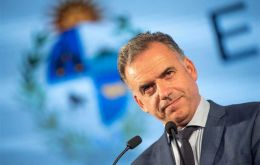
Uruguay's President-elect Yamandú Orsi announced that he will not be occupying the Suárez y Reyes Residence after taking office on March 1 but would rather stay at his current domicile in Salinas. “With my family, we already solved some things, like staying there in Salinas. My children are moving on to another stage,” he added regarding their attending high school.
-
Monday, October 14th 2024 - 17:47 UTC
In a dull campaign and dull candidates, Uruguay votes new president and parliament on Sunday October 27
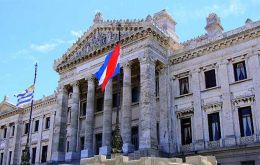
In less than two weeks time, Sunday 27 October, 2,8 million Uruguayan voters will be electing a new president, and a new parliament, 99 Lower House members and 30 Senators for the 2025/2030 period.
-
Monday, January 23rd 2023 - 06:55 UTC
Lawmakers from Uruguay's ruling coalition to visit the Falklands; opposition rejects embassy invitation
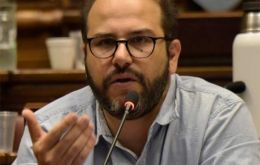
Uruguayan opposition rejected an annual invitation from the UK embassy in Montevideo for lawmakers from all political parties represented in Parliament, to visit the Falklands/Malvinas Islands. The ruling coalition in Uruguay, made up of five parties accepted the invitation.
-
Friday, September 16th 2022 - 09:45 UTC
Lacalle Pou and Mujica found to be most popular politicians in Uruguay

Uruguay's President Luis Lacalle Pou (2020-2025) and ex-president José “Pepe” Mujica (2010-2015) top the list of most-liked politicians in the country, a survey by pollsters Equipos Consultores released Thursday showed.
-
Friday, March 25th 2022 - 09:55 UTC
Uruguay: Mujica favors “Aye” vote against “aristocratic” LUC

Former Uruguayan President José “Pepe” Mujica said Thursday said the Law of Urgent Consideration (LUC), which has been a pillar of the current Multicolor coalition, had a certain “aristocratic” ring and a barrack-like approach at issues.
-
Monday, December 17th 2018 - 00:59 UTC
Uruguay's “Live Without Fear” to hold constitutional reform plebiscite for harsher penal code

The Uruguayan “Live Without Fear” (Vivir Sin Miedo) campaign collected 376,427 signatures, way above the Electoral Court's threshold to force a a plebiscite on security matters in the next elections, Senator Jorge Larrañaga announced Saturday.
-
Saturday, September 29th 2018 - 14:17 UTC
March for Diversity illuminates Montevideo in favor of LGBT culture
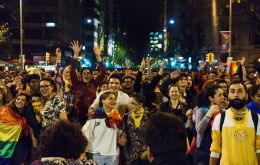
Since 2006, the March for Diversity illuminates every year the most important avenue in Montevideo with a 'comparsa' of thousands of people who dance, celebrate and shout slogans in favor of policies for the rights of the LGBT community. In this year's edition, held on Friday, many marched with yellow and red handkerchiefs, colors chosen by the movements of activists in favor of the so-called trans law, which is under discussion in the Uruguayan Parliament. Diplomatic figures such as the ambassadors of the United Kingdom, the United States and Canada participated in this march with their own posters and slogans.
-
Friday, April 27th 2018 - 10:47 UTC
Mujica supports the FTA with Chile: Piñera begins his commercial tour avoiding Uruguay
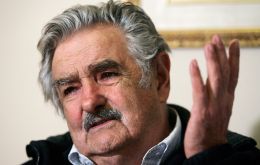
While Chilean President Sebastián Piñera started a commercial tour in Brazil last Thursday, in which he avoids Uruguay because the Free Trade Agreement (FTA) with Chile is blocked in the Uruguayan Parliament since 2016, ex-president José Mujica explained that he supports the FTA with Chile in order to look for “the best incentives to ensure commercial stability.” The bench of former president Mujica and the communist party refuse to approve the commercial agreement.
-
Wednesday, January 17th 2018 - 08:37 UTC
Uruguayan farmers surprise government and take to the roads to protest fiscal policies
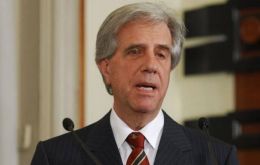
Uruguayan farmers with their tractors, harvesters, trucks, vans and on horseback took to the roads to protest the cost of fuel, power, increased taxes and an over bloated national budget and bureaucracy which they blame for making several farm activities unprofitable, and have had an overall negative impact for the different camp activities.
